Monday, June 30, 2008
Editors vs. police chief
by Larry Geller
Today’s Advertiser editorial discusses the certainty that iwi will be discovered along the proposed Honolulu transit route. They don’t qualify it, of course, with anything like “should the project not be defeated on the November ballot.” But nevermind. They did choose to diss the Kauai chief of police, though:
Most recently, a Kaua'i homeowner who passed the reviews by the island burial council and secured the permits nonetheless was told to halt construction by Kaua'i Police Chief Darryl Perry, who cited burial desecration law. Since the homeowner had followed council direction to leave the burials in place and decided to build above them on post-and-pier supports, this decision is utterly incongruous. [Honolulu Advertiser, 6/30/2008]
“Utterly incongruous?” It was surprising, but also refreshing. Utterly refreshing.
As an astute blog reader, you may have been following this issue on one of the local blogs. Journalist Joan Conrow recently wrote, quoting in part an article from The Garden Island (italics):
Looking forward, KPD Assistant Chief Roy Asher said the issue will be addressed by the judicial system. “It’s in the courts now, which is where it belongs,” he said.
Yes, that is where this issue belongs. And how much wiser of the Chief to put it into the system this way, rather than through an untold number of trespassing cases that, aside from all their drama and angst and potential for conflict with the police during arrests, would allow construction to continue while they wend their way through court.
So what’s incongruous to an editor is wise to many of the people who live there. Chief Perry may still have figured incorrectly with regard to his interpretation of the statute, but as the above indicates, the courts will sort it out. And it’s about time. If you click on the first link in this post you’ll be taken to a DLNR web page that will be at least an introduction to the issue of grave desecration. I know that there are more and better discussions out there, but that page is not a bad start I hope. Perry skillfully avoided a confrontation that would have fractured the community. I think he has earned respect through his action and that’s better than cracking heads on behalf of a developer (which is a more accurate description than “homeowner” for a serial house builder).
I suppose the Oahu point of view is that developers and related interests are always right. Could the fact that they are also advertisers have any influence on editorial judgement?
Elsewhere in the paper is an article about how many high rises have been given height exemptions. You’ll also recall that a transit stop is suddenly being considered for Mapunapuna just because a developer wants it, never mind whether it’s good for the community or for ordinary non-developer people like you or me.
Could the fact that developers and related interests are big campaign contributors have any influence on mayoral or councilperson judgement?
Sometimes I wish I had a few million dollars to test this out. How many editorials, congressmen, legislators or city council people could I buy with, say, just $1 million? Would it be a better investment to concentrate on local government, or should I spend my money at the state or federal level?
If I just scattered money around the halls of the State Capitol, say a few hundred thou in $20 bills, would I have to report that as campaign contributions? I could split it up into $25,000 chunks and every Tuesday, say, hire Abba to follow behind singing “Money, money, money” as a kind of signal for them to rush out of their offices and grab what they can. Oh, what a spectacle it would be!
Is the thought of paying for laws or opinions any more “utterly incongruous” than what Chief Perry did? And please, no one tell me that commercial media or politicians are independent of those who keep them in business.
Well, I can dream. I can also dream of the day when we have something like popular democracy to replace the influence of corporate and elite money in our government, and a press that would never, ever, act as cheerleaders for war. Or for burying beautiful Hawaii under concrete and asphalt, for that matter.
Saturday, June 28, 2008
Location, location, location: Three reasons why today’s Advertiser editorial made me laugh.
by Larry Geller
On Saturday mornings, after reading the serious stuff in the paper, my first opportunity for a laugh is David Shapiro’s flASHback blog, now in print. Next, the comic page, which, I’ll have to admit, is one of the main reasons I subscribe.
Today, though, the editorial was first in line to give me a chuckle. It’s about locating a high-containment laboratory stocked with deadly human pathogens amid the condos of Kakaako, a long-running controversy.
Let’s dissect it.
Headline: Kaka'ako biosafety lab has some key benefits.
Yes, these labs are called biosafety labs. This lab has also been described at a neighborhood board meeting as “a Level 3 Regional BioSafety Laboratory. Level 3 laboratories are used to study agents that may potentially cause lethal infection, but which may be transmitted through the air.” I just want everyone to know what the term “biosafety” implies in terms of, um, safety. Does this sound like anything you might choose to locate near condos and a recreation area?
Let’s go on.
Reading down, there’s this:
Above all, given Hawai'i's geographic isolation and proximity to Asia, the lab would better position us to diagnose and withstand an epidemic.
So we’re isolated and proximate. Good trick. Far but near. Hazardous but safe. You just have to believe.
As voiced by many, including originally by State Senator Gorden Trimble, the concern is the proposed location, not so much about having a lab in Hawaii.
Still, it's crucial that the concerns of residents and community leaders are addressed. While it's true that the new lab would be near a rapidly growing urban area of homes and businesses, there's no reason it could not be a suitable neighbor.
Funny!! “it’s crucial that the concerns of residents and community leaders are addressed??” The editorial advocates ignoring those concerns. Watch the logic twist and dance.
Similar labs are in far more densely populated areas, including Washington, D.C., downtown Atlanta and Boston.
The facility must meet stringent federal and state safety standards.
Now, we all know how stringent federal safety standards have become. One could worry especially if they allow similar labs in densely populated areas of Washington, Atlanta and Boston. Do they also have standards for locating labs in an area that could be subject in the future to tsunamis? Imagine those little pathogens swimming freely in the surf around Honolulu.
For the project to thrive — as it should — an unwavering commitment to take no shortcuts and put public safety first is needed from the get-go.
This is the punch line. If public safety is first, then the lab should be located elsewhere, and we should take no shortcuts, like putting it next to the medical school in Kakaako. Will public safety suffer if a lab is located in a safer location, one away from dense housing and proximity to the water?
High-containment labs are difficult and expensive to maintain, as was revealed in the UK in 2007 when foot and mouth disease escaped a supposedly secure facility and infected eight nearby farms. You have to ask about the wisdom of locating that laboratory in the prime farmland of Pirbright, Surrey. Of course, it was expeditious to put it right next to the Institute for Animal Health.
Sounds similar to putting a risky lab full of human pathogens next to the medical school in residential Kakaako, doesn’t it?
Shouldn’t a lesson be learned and the mistake not be repeated?
Ok, on to the comics page. I like Frazz, it’s funny, literate and logical, all at the same time.
Tuesday, June 24, 2008
George Carlin
I can do no better than to send you to this article in The Nation:
George Carlin, American Radical
The article links to this YouTube video, might as well put it here as well:
Monday, June 23, 2008
The press may be dying, but it’s an American problem
by Larry Geller
If you read the overseas newspapers via the web, you probably already know that media are dying here in America but still thriving overseas.
We Don't Need to Catch the US Media's Cold
Journalists keep droning on about 'the death of their profession', but they're mostly US journalists talking about the death of US journalism. By Peter Preston
…
America's press, on this examination, is deeply conservative and deeply caught up with its own self-image. Recession and the advance of the internet blow mist all over the battlefield. But the crucial element in its distress is just plain, old-fashioned ineptitude. Too many companies paid too high a price to gobble up competitors in the fat years and now can't service their debt mountain as times grow thinner.'There's been a lack of compelling strategic vision and subsequent execution that would make creditors comfortable that lending to a newspaper company over the long horizon is a proposition they could be compensated appropriately for,' one influential analyst, Mike Simonton of Fitch Ratings, told Editor and Publisher a few days ago. They all insist they have a digital strategy, but cannot articulate it. But 'the margins available in the digital space will not replicate what's going on in the print space, with its high fixed costs. So how are they going to get there?'
Many big names aren't going to get there. Some of the biggest - such as the Tribune Company and McClatchy - are wilting under the pressure. The pressure to hack costs to service this debt is relentless, but hacking merely accelerates the spiral of despair. Is it journalists' fault that too little has happened, too late? In part. US papers have been slow to change. Why only now discover that readers don't carry on following extended tales from page one to page 91? Why be so keen on ubiquitous news ripped from the agencies when that also pours continually from every cable TV orifice?
As I’ve asked before, what will happen to the “digital strategy” as more and more users adopt ad blockers? Sooner or later, advertisers will catch on that reading the news on the web isn’t like reading it in the printed paper, where that furniture ad (or worse) is right there in your face.
Sunday, June 22, 2008
Monitoring the media
Now that there is one Republican and one Democratic candidate for president, the media move into full swing. Anyone who believes that the commercial (or “main stream”) media  are fair and balanced is somewhat gullible, to be generous. Mostly the newspapers, magazines and TV station owners feel they can be players in politics. Our local papers are no exception to this.
are fair and balanced is somewhat gullible, to be generous. Mostly the newspapers, magazines and TV station owners feel they can be players in politics. Our local papers are no exception to this.
The news may be blatantly slanted or the bias may be more subtle. Often bias is expressed by omission, or by adopting a particular frame (see below). By using the linguistic frame, the reader is psychologically biased while reading. It works.
Bias can be almost invisible if only certain letters to the editor are printed, or only certain op-eds are selected or solicited. Bias can occur when the paper prints the propaganda put out mainly by particular self-serving think tanks. Bias can be expressed by selecting mostly right-wing commentaries with some token writers from the left sprinkled in to produce “balance” that is really badly skewed.
In our modern media the truth has been sadly devalued. And let’s not even get into the extent to which the media cheerled this country’s march toward war in Iraq. Without the support of a compliant and unquestioning press, George Bush could not have done it. Yes, the media have blood on their hands.
So it’s helpful to have ways to monitor the media and reveal its biases. This is seldom done for local papers, but national media can justify the investment of time. One of my favorites websites is MediaMatters.org. I subscribe to their email notification and each day they send a short summary of the day’s lies, distortions and omissions. You may have your own favorite, there are other choices and several “fact checking” sites as well (try the email feed from factcheck.org). Another favorite is Fairness and Accuracy in Reporting and their radio program Counterspin, which is also available as a podcast.
For an antidote to the whole thing, watch or visit the website of Democracy Now!.
If you subscribe to one of the monitoring services you’ll see how badly biased things are. Our commercial media are willing to spread unfounded rumors and outright lies. Obama is the usual target these days, but anything “left” of extreme right is fair game.
Clearly the commercial media would like to see McCain elected. You won’t believe the lengths they’ll go to each day to achieve this. Subscribe to one or more of the above websites and see what you think after a couple of days.
See also if you can figure the biases driving our local media. One, of course, is a bias related to their advertisers. Product placement for the big payers, and of course they try to avoid printing very much bad news that might offend them, though I’m glad to see what does appear.
Here’s George Lakoff:
[George] Lakoff argues that the differences in opinions between liberals and conservatives follow from the fact that they subscribe with different strength to two different metaphors about the relationship of the state to its citizens. Both, he claims, see governance through metaphors of the family. Conservatives would subscribe more strongly and more often to a model that he calls the "strict father model" and has a family structured around a strong, dominant "father" (government), and assumes that the "children" (citizens) need to be disciplined to be made into responsible "adults" (financially and morally responsible beings). Once the "children" are "adults", though, the "father" should not interfere with their lives: the government should stay out of the business of those in society who have proved their responsibility. In contrast, Lakoff argues that liberals place more support in a model of the family, which he calls the "nurturant parent model", based on "nurturant values", where both "mothers" and "fathers" work to keep the essentially good "children" away from "corrupting influences" (pollution, social injustice, poverty, etc.). Lakoff says that most people have a blend of both metaphors applied at different times, and that political speech works primarily by invoking these metaphors and urging the subscription of one over the other.[4]
Lakoff further argues that one of the reasons liberals have had difficulty since the 1980s is that they have not been as aware of their own guiding metaphors, and have too often accepted conservative terminology framed in a way to promote the strict father metaphor. Lakoff insists that liberals must cease using terms like partial birth abortion and tax relief because they are manufactured specifically to allow the possibilities of only certain types of opinions. Tax relief for example, implies explicitly that taxes are an affliction, something someone would want "relief" from. To use the terms of another metaphoric worldview, Lakoff insists, is to unconsciously support it. Liberals must support linguistic think tanks in the same way that conservatives do if they are going to succeed in appealing to those in the country who share their metaphors. [from Wikipedia]
June 23 Kokua Council Program: The Rush to Biofuels
Monday, June 23, 2008
11:30 a.m. to 1:00 p.m.
Miyama Main Hall, Harris United Methodist Church
Nuuanu Ave. and South Vineyard Blvd.
Ample parking - driveway off Nuuanu Ave.
Agenda:
11:30 Luncheon: Selection of Pizza, Salad, Dessert from Marilyn, $5.00 Donation
11:50 Welcome, Introductions and Remarks, Larry Geller, President
12:00 Program: “The Rush to Biofuels,” Henry Curtis, Chair, Life of the Land
1:00 Adjourn
Real gasoline has become so expensive that people are thinking before taking the car somewhere. So now we turn corn into booze and put it in our gas tanks. Entrepreneurs are transforming used restaurant oil into diesel fuel that smells like french fries. Algae are supposed to make fuel for us also.
Will any of this work? Did we screw up by requiring 10% ethanol be added to our gas? Henry Curtis may explain. If not, I’m going to ask him.
Please try an attend this timely meeting and learn the truth about biofuels.
Skinned cadaver promo pic featured by Advertiser even on its editorial pages
Most editorials or editorial columns are just words, but a large 7 1/4” x 4 1/4” picture of a skinned cadaver made it into today’s paper. Editor Mark Platte ended his column with “We shouldn't overplay the story, but hiding it from readers isn't going to make it go away” as he overplayed the story yet again with the prominent publicity picture.
"The human cadaver pictures are chilling, to say the least," [a Honolulu woman] wrote. "I may sound like a bit of a Pollyanna but I'm negatively affected by gore, horror and cruelty. Sensitivity to others is important. Not everyone thinks this is entertainment."
I’ll bet many people think it’s not appropriate for the editorial page either, particularly since the article would have been just fine without the large publicity spread.
That space could have accommodated an entire article on some subject important to readers.
Why is this picture there, while photos of Iraq war wounded and dead are essentially banned from the Advertiser, as they are in most US papers? Because the exhibitors are important customers.
Since our first story ran in late May, The Advertiser entered into an advertising trade agreement with the group that is staging the exhibit. The paper, through its Newspaper in Education program in the circulation department, will also print an eight-page tabloid in August that can be used in classrooms, as has been done by many other newspapers where the exhibit has toured.
The agreement seems to have bought the exhibitors more than just advertising space. It has bought them prominence in bylined news and editorial articles.
Remember, you and I are not the customers, we are just readers to be delivered to the paying advertisers. In this strange editorial column, Platte confirms why the pictures that many have objected to are in his paper anyway.
Friday, June 20, 2008
Rat attack—why we must defend our borders
 I am happy to report that despite the evil suicide rat attack on our condo, we have reached what I think is a turning point. Over the next few days, I have confidence that order (and HECO electricity) will be restored. We may also get the bill for this war to regain our freedom to use air conditioners and our laundry room. It may cost us dearly, but we will have prevailed. I am sure of it.
I am happy to report that despite the evil suicide rat attack on our condo, we have reached what I think is a turning point. Over the next few days, I have confidence that order (and HECO electricity) will be restored. We may also get the bill for this war to regain our freedom to use air conditioners and our laundry room. It may cost us dearly, but we will have prevailed. I am sure of it.
What that rat did was unthinkable, and we must begin to guard our borders. It is not acceptable that any undocumented rat can pass through our CCTV perimeter and evade our security staff. Henceforth, all rats will be held collectively responsible. To start with, security will round up any rats found loitering near electrical or other essential installations. They (the rats) will be confined in cages and treated humanely. Yes, we’ll treat them just like we treat our fellow humans.
We’d be smart to consider constructing a security fence around the property to keep illegal rats from crossing over (pet rats must have chips implanted and submit a loyalty oath).
This is the American way.
AMY GOODMAN: Let’s talk about that word “security” and how it’s been used since 9/11 in referring to the border between Mexico and the United States.
JOSEPH NEVINS: Well, “security” is—it’s a user-friendly term, I mean, in the sense that it means almost anything to anyone, depending on who’s employing it. And in the case of the US-Mexico boundary, “security” has become the excuse for almost anything. While the term “security” was used prior to 9/11 to justify the buildup that began, for example, under the Clinton administration in 1994, 1995, it’s been employed to a far greater extent over the last few years.
And so, today, if you go to the US Border Patrol’s website, for example, the first thing they talk about, in terms of what their mission is, is to fight terrorism. Right? Now, what terrorists are crossing the US-Mexico boundary? There’s not been a single so-called terrorist caught crossing the US-Mexico boundary before or after 9/11, right? So that begs the question: what is the US Border Patrol doing? Well, the US Border Patrol, in the larger system, the larger Department of Homeland Security, of which the Border Patrol is now a part, are basically about—what they’re about is catching, for the most part, people who are looking for jobs, people who are trying to rejoin their families.
If I could just read one quote from the book, this comes from an article from Reason magazine. It has this incredible quote from a US Border Patrol agent, a Border Patrol agent who, by the way, is a media spokesperson, so he’s been trained by the US Border Patrol to present the best face. And here’s what he said to a reporter last year, quote: “We’re fortunate enough to be a country where there are lots of opportunities. And most of the people who we run into out here want to make that dream happen. Unfortunately, it’s our job to stop that dream. That’s what we do on an everyday basis." So, on the one hand, the Border Patrol is saying, “We’re all about security. We’re fighting terrorism.” On the other hand, when you talk to the actual Border Patrol agents—I mean, some of them buy into that rhetoric of security, but a lot of them understand in a very deep way what they’re actually doing, right, and that is, helping to deny people basic human rights, as this Border Patrol agent so eloquently said. [Democracy Now, 6/20/2008]
 | Dying to Live: A Story of U.S. Immigration in an Age of Global Apartheid (City Lights Open Media) by Joseph Nevins Read more about this title... |
 | Operation Gatekeeper: The Rise of the 'Illegal Alien' and the Remaking of the U.S.-Mexico Boundary by Joseph Nevins Read more about this title... |
Update: There was a short story on the power problem in yesterday’s Star-Bulletin. It’s amazing how many factual errors the story contains. Also, one resident complained about poor maintenance, so that got put into a pull quote, but actually, IMHO, we have one of the best maintained condos in Honolulu.
Thursday, June 19, 2008
What the flag pin means to the world
 When I visited our congressional delegation last year in Washington it was truly amazing to notice that almost everyone in the Capitol who was wearing a jacket also sported a flag pin.
When I visited our congressional delegation last year in Washington it was truly amazing to notice that almost everyone in the Capitol who was wearing a jacket also sported a flag pin.
They smiled and joked as we shook hands, treated us to soda pop, cookies and light conversation. The shiny flag pin spoke of American patriotism, hospitality, good humor.
Meanwhile, over at Guantanamo:
AMY GOODMAN: Dr. Allen Keller, how did it compare—you’ve treated people from eighty countries for torture. How did these prisoners compare who were tortured in US custody?
DR. ALLEN KELLER: The forms of abuse that we learned of, that we documented, are as bad, if not worse, than any I’ve heard from anywhere around the world. We arguably, tragically, are second to none in these techniques that have been used. It doesn’t mean that in countries it’s not used with much greater frequency, but I think this has actually really important ramifications.
JUAN GONZALEZ: The report—some of the men you mention, portions of what they have suffered have come out in different reports in the past, but I don’t think the detail and the extent that you have. I just wanted to read a couple of graphs of some of the individuals you mention.
One was Amir, a salesman in the Middle East who was captured in Iraq in 2003. Besides the sleep deprivation and the other things you also mention, I want to read this part. It says, “At first, he was not mistreated but then was subjected to religious and sexual humiliation, hooding, sleep deprivation, restraint,” so on. He says Amir recalled experiencing—he was placed in a foul-smelling room and forced to lay down in urine, and while he was hit and kicked on his back and side, Amir was then sodomized with a broomstick and forced to howl like a dog while a soldier urinated on him. After a soldier stepped on his genitals, he fainted. In July 2004, he was transferred to the prison at Camp Bucca, where he reported no abuse. And then, this was at Abu Ghraib that this happened.
Another prisoner, Yussef, who was captured in Afghanistan, talked about being subjected to electric shock from a generator, feeling, quote, "as if my veins were being pulled out.” So this was really not only borderline examples of torture; this was actual physical torture that was occurring here against some of these men. [Democracy Now, 6/19/2008]
Those smiling congresspeople, they knew exactly what has been going on at Guantanamo and other so-called black sites around the world, including a secret fleet of prison ships. And they were not spending any significant portion of their days working to bring this American-inflicted horror to an end.
How could they sit there and make jokes with us, as though all was well with the world?
Update: This just in, click link for C-Span video and transcript:
Ex-State Dept. official: Hundreds of detainees died in U.S. custody, at least 25 murdered
19/06/08 -- -- At yesterday's House Judiciary Subcommittee on Civil Rights hearing on torture, Lawrence Wilkerson, former chief of staff to Colin Powell, told Rep. Jerrold Nadler (D-NY) that over 100 detainees have died in U.S. custody, with up to 27 of these declared homicides
Remember when you read the word “detainees” that they are all innocent people, never charged or convicted of any crime, yet they were murdered during interrogation or in custody. By our government. By us.
“The forms of abuse that we learned of, that we documented, are as bad, if not worse, than any I’ve heard from anywhere around the world.”
I smelled a rat
It’s been quiet on this blog since a rat with suicidal intent visited our condo a couple of days ago. It chewed through an electrical cable which sparked and caused a fire badly damaging the electrical switchgear supplying power to three large buildings.
I was told that the rat was still alive when the fire engines came, and although they  were asked to give it CPR, the firemen refused. So it died. No chance to interrogate it to find out if it acted alone or was part of a larger band of evildoing rodents.
were asked to give it CPR, the firemen refused. So it died. No chance to interrogate it to find out if it acted alone or was part of a larger band of evildoing rodents.
We were without power initially for more than 24 hours.  But we have a great staff, and the resident manager called in portable generators that were connected with thick copper cables while repairmen checked for parts of the switchgear that still worked. It was quite a job arranging things so that the generators could take over.
But we have a great staff, and the resident manager called in portable generators that were connected with thick copper cables while repairmen checked for parts of the switchgear that still worked. It was quite a job arranging things so that the generators could take over.
Our UPS powered the computer for a few minutes so that things could be shut down in an orderly manner. We have battery lanterns and radios and didn’t suffer too much. We didn’t open our fridge, but some people did, and they would have lost everything.
Across the street we met many of our neighbors over at Zippys at mealtimes. And I even got some work done by taking my tablet PC to a hot spot.
But not much blogging. We are cooperating by keeping computers and other unnecessary equipment turned off.
Every few hours a truck comes to refill the generator tanks with Saudi crude. They drink it literally by the barrel, and you know what a barrel costs these days. I’m amazed that generators this small and quiet (though stinky) can supply enough juice to run buildings with hundreds of apartments.
At the same time, I’m afraid of what the cost will be to all of us (1,200 people + or – a few hundred) thanks to this one rat on a mission of mass destruction.
Saturday, June 14, 2008
Now that the federal court isn't watching, the Dept of Health cuts back on mental health services
I doubt that the Hawaii Department of Health could get away with cutting Assertive Community Treatment (ACT) services if Judge David Ezra was still breathing down their neck. Actually, the judge was quite lenient, allowing both the childrens' (Felix) and the adult (State Hospital) lawsuits to drag on for years, but at least there were busy attorneys able to bring violations to the attention of the Court.
The DOH announcement that it will cut off ACT services should not be viewed in isolation. There is a dark history here, of which this may be only the latest part. Knowing a little of it may help put the current controversy in perspective.
The big federal lawsuits are over, and the DOH appears to be reverting to its its "blame the providers" modality to excuse its own management failure and to cut back on services to consumers. The evidence is in the articles just appearing in the daily papers, but the problem is of very long standing.
Today's Star-Bulletin article, State defends change to mental health help, raises questions about DOH's oversight of the contracts serving its mental health clients:
"We have been cast as having made frivolous, overnight decisions, and that is not the case," Michelle Hill, deputy health director for behavioral health and Adult Mental Health Division acting director, said yesterday. "I believe we have made appropriate business decisions ... to better insure good outcomes for consumers and accountability to the public," she said, explaining that ACT programs have experienced problems nationally.
She said providers were not following the ACT model and that the department was paying for a full array of services whether clients needed them or not.
Because ACT services were not being provided, Medicaid had to be billed for a lower level of services, Hill said.
If "providers were not following the ACT model" you have to ask why the DOH allowed that situation to continue. We'll get back to this point in a moment.
Cost cutting has taken precedence over consumer needs
The community has rallied in the past against DOH cutbacks, as for example when the DOH under Bruce Anderson stubbornly insisted on closing down the Diamond Head mental health facility despite overwhelming community and professional opposition.
Consumers who had moved close to the facility were told they'd have to take buses to get to Lanakila instead, even though some were probably not able to do so. Anderson's heart was not softened, and it took a call to Gov. Cayetano who was in California as I recall, to quash that unfortunate plan.
Autism parents reacted angrily and ultimately successfully when DOH illegally cut back on services to their children. Only a meeting at the school, as prescribed by law, can make that decision, but the DOH didn't care much for the law (the state was found in contempt of the Felix Consent Decree). It took TV cameras and parents waving the proof, papers they received demonstrating illegal DOH cutbacks, to get the DOH to reluctantly relent and restore the cuts.
DOH's ongoing war against its provider network
Through the years DOH (and state legislators) have found it convenient to blame service providers for the high costs of the system they created. There were indeed some provider excesses, but one must say also that those were made possible by DOH contracting inadequacies and oversight lapses or they would not have happened.
From my days working with Felix children I know that the DOH is quite happy to set up a provider to fail with lack of guidance/oversight, then crack down by withholding funds and attacking the provider. Often the rules that the provider "failed to follow" were never explicated prior to a DOH crackdown. DOH also employed audits punitively rather than remedially, targeting specific providers or agencies.
Even if a provider agency did a good job, DOH would withhold funds to the point where payrolls could not be met and individual providers were forced to leave the state because they couldn't afford to live here without pay. One situation I have in mind is the Mokihana Project in Kauai, which was considered a model during the Felix lawsuit. Nevertheless, DOH authorized services but withheld contract payment for months. I interviewed a psychologist by phone from the airport, on his way to the Mainland because he had not been paid. His work was not in question. It was DOH mismanagement (and that's being generous to them, since rumors circulated that the strangulation might have been deliberate).
When Felix services were privatized because the DOH Family Guidance Centers could not deliver services in the quantities needed, DOH repeatedly and illegally cut back on services to individual children in reaction, no doubt, to the increased cost of providing services as the law and the federal court required. Later on they concentrated more on training and managing their many contracts, and just before the baby was thrown out with the bathwater as services were transferred to the Department of Education, training and better oversight replaced cost cutting in contract management.
No doubt there is more to this than has come out so far in the papers. From today's Advertiser story, State defends planned change in providing services for mentally ill:
The state Department of Health says it plans a more effective way to deliver care to its most severely mentally ill patients. Critics contend the plan could throw DOH's Adult Mental Health Division into chaos, overwhelm the system and pose a risk to patients and the public.
...
"What we have discovered upon monitoring all the ACT providers is that we have not been able to achieve the true ACT service," Hill said. "What we're finding instead is that they have actually been delivering is more consistent with CBCM."
These services have been provided since 2003, plenty of time for DOH to get the house in order, if it were interested in doing that. Perhaps it is time to investigate whether DOH is properly managing its mental health services before there needs to be another federal lawsuit.
Maui neglected, now to be cut off
Maui has long been the neglected stepchild in Hawaii's mental health system, with service deficiencies that linger for years after Oahu is attended to. Understaffing, accusations of discharging patients from the hospital to the beach without meds, waiting lists, lack of services—and now discontinuation of a program that started only last year, lagging about four years after Oahu, according to this article, State orders change in mental health care programs. It seems that Maui is about to get shortchanged again:
Established on Maui in March 2007, the ACT program just had begun to treat patients successfully. [Colleen O’Shea Wallace, ED of Mental Health America in Maui County] said she was concerned discontinuation of ACT would set back care of Maui County’s most severe mentally ill.
“These people will get lost again,” she said.
Harriet Collopy, a member of National Alliance on Mentally Illness who runs two 12-week support groups for families with mentally ill loved ones, said she knew at least one woman who would not get needed ACT services due to the pending changes.
Collopy said her own son, also diagnosed with schizophrenia, gets services on Oahu because of limited services available on Maui.
“We hear this over and over again. . . . People are just not getting the services they need here,” she said.
How this will play out is not yet known, it depends on who will prevail in the clash between consumers, advocates, service providers and parents on one side and the Department of Health on the other.
You need attorneys to get mental health services here
Consumers in Hawaii historically have had to rely on a dedicated group of attorneys and the federal court for the services they have received from an uncaring state government, and that's very sad indeed. If the system is indeed thrown into chaos, then it will be attorneys again who provide the repairs.
So I think it's reasonable, in view of the long history of neglect and cutbacks, to question this decision for the sake of all those who will lose the services that have benefited them up till now.
The state of the state's weeklies
Today marks the end of the Hawaii Island Journal.
Publisher Laurie Carlson has shut it down due to lagging ad revenue (see Ian Lind's article here). What's left is a virtual media monopoly on the Big Island. It's too much to hope that the paper might be reincarnated somehow, but if that could happen, it would allow alternative expression to live on. And that's important for a vibrant democracy.
I was raised in New York with alternative radio, WBAI, and alternative publications of all kinds, at the head of which was the Village Voice. We moved to Tokyo where it's not unusual that people read more than one paper a day, including a rich array of alternatives. And then Hawaii, where we have only a few pages of weekly alternatives.
The Village Voice was a fat publication. Traveling across the country and picking up the weeklies, I envy their readers. Most papers are very substantial. We have so little here. I mean, little in the total page count of alternative opinion, reporting and commentary.
My understanding is that the Honolulu Weekly (and the Hawaii Island Journal) are (were) printed on the Star-Bulletin/MidWeek presses, and that the Advertiser isn't a competitive option. That is, they won't print alternative weeklies. If there are so few options, that makes publication of a weekly paper a precarious thing. With the price of shipping going up, I wonder if printing any paper out of town can make economic sense (I just don't know). If the Big Island wants to have a free weekly paper, what choices do they have to print it locally, that is, economically?
And let's face it, we're getting mostly ads and entertainment listings in the Honolulu Weekly. It's no Village Voice, and journalism isn't its main thrust. While I'm glad to see the articles they do run, those articles are very few. We're not necessarily getting our money's worth.
Bloggers might take an interest in the possibility of a resurrection, if the business aspects can be worked out (which could be daunting). We have one instance of a blog migrating to print: David Shapiro's popular weekly flASHback blog article is now a regular feature in the Advertiser. I hope they're paying him for it. Of  course, he wasn't an independent blogger to begin with. But it can happen. Blog-newspaper combinations may help weekly alternative papers squeezed for revenue stay alive.
course, he wasn't an independent blogger to begin with. But it can happen. Blog-newspaper combinations may help weekly alternative papers squeezed for revenue stay alive.
There is great synergy in writing both for print and for the Internet. Believe it or not (because you are all web-savvy), some people still don't surf the web or read blogs, but they do read newspapers. Far more people read Shapiro's article in the paper than ever read it on the web, I feel certain. I'm glad to see Ian Lind and Joan Conrow in print so often in the Honolulu Weekly.
We should be concerned about the loss of alternative media. If one day the gestapo comes busting down doors in middle of the night to carry away the bloggers, knowing how to get the word out in print will be the killer technology.
So although it's probably a difficult task, I hope that the Big Island can find a way to perpetuate what was an important and unique alternative publication.
Friday, June 13, 2008
Congress should have no choice but to proceed on impeachment
According to former federal prosecutor Elizabeth de la Vega in this segment from Counterspin (a weekly program aired on Hawaii Public Radio and available anytime as a podcast), Congress and the press ought to be very interested in several of Kucinch's articles of impeachment.
This week on CounterSpin: It seems unlikely that media elites would deny that things like maintaining illegal torture programs, unlawfully surveilling citizens, imprisoning children in violation of the Geneva Convention and destroying evidence are serious matters. So why, when such things lead to a call to impeach George W. Bush, does the whole matter become something of a joke? We'll talk to former federal prosecutor and author Elizabeth de la Vega about press handling of impeachment charges. [Elizabeth de la Vega on impeachment, Catherine Lutz on Iraq bases ]
When it was Bill Clinton's turn to be impeached for much less, Congress jumped at the chance. What's different? And why is the press refusing to cover the issue, which is not far from participating in a coverup of Bush's crimes? Bush lied, people are now dead, more are being killed. You'd think this would be important. I meant important to Congress and the press. It is one of the most important issues on the table today, unless you own a newspaper, a tv station, or a Congressman.
Download the program and listen at your computer, your iPod, iPhone, mp3 player or iWhatever.
Impeachment is off the table--at the Honolulu Advertiser
If you surf the web, read or watch alternative media, or even if you check CNN's website, you are probably aware that Rep. Dennis Kucinich has just read articles of impeachment on the House floor and that the House, Democrats and several Republicans, voted to send that to the Judiciary Committee (which, in all likelihood, probably will not act).
But so far anyway, unless I've missed something, you wouldn't know any of that if you depend only on the Honolulu Advertiser for your news.
--Vincent Bugliosi
If you were looking for any mention of impeachment in the paper today, you would have found instead, across the top of p. A7, the headline "Italy's prime minister heaps praise on visiting Bush." The article was given the entire page, that is, the portion around the large ad.
Suppose they did cover the story. You can bet it would result in letters to the editor, both pro and con, which they would have to sort through and maybe print. This is what newspaper owners don't want you to see—discussion of impeachment on their pages.
Of course, you can read about the impeachment resolution all over the web. There are YouTube videos and it was even on CNN's website.
Kucinich was interviewed today on Democracy Now. The transcript is here, or you can go to the website to see the video or to listen to the interview. It will be on channel 56 at 10 p.m. tonight for Oahu viewers.
Impeach him, heck, try him for murder
Already on the NY Times best seller list (if not mentioned elsewhere in the Times) is the just-released The Prosecution of George W. Bush for Murder, by Vincent Bugliosi. He was the Charles Manson prosecutor who now makes a case for trying the president for the deaths of 4,000 American soldiers in Iraq.
| The Prosecution of George W. Bush for Murder by Vincent Bugliosi Read more about this title... |
Vincent Bugliosi is one of the most successful prosecutors in this country, with a record including twenty-one murder convictions without a single loss. With a new book, he outlines his case for the prosecution of George W. Bush for murder....
...So we know—not “think,” but we know—that when George Bush told the nation on the evening of October the 7th, 2002, Cincinnati, Ohio, that Hussein was an imminent threat to the security of this country, he was telling millions of unsuspecting Americans the exact opposite of what his own CIA was telling him. So if we had nothing else at all, this alone shows us that he took this nation to war on a lie, and therefore, all of the killings in Iraq of American soldiers became unlawful killings and therefore murder.
But it gets worse. October 4th, three days after the October 1st classified top-secret report, Bush and his people had the CIA issue an unclassified summary version of the October 1st classified report, so that this report could be issued to the American people and to Congress. And this report came to be known as the “White Paper.” And in this White Paper, the conclusion of US intelligence that Hussein was not an imminent threat to the security of this country was completely deleted from the White Paper. Every single one of these all-important words were taken out. And the question that I have is, how evil, how perverse, how sick, how criminal can George Bush and his people be? And yet, up to this point, unbelievably—and there’s no other word for it—he’s gotten by with all of this. [Democracy Now!, 6/13/2008]
Newspapers across the country are losing readership. We readers, I think, can understand why. Try and follow news on the Iraq war or on Israeli-Palestinian clashes in your daily paper. As we move towards the general election, see if their coverage of Bush administration failures increases or decreases. They won't miss a smear story on a candidate, though, will they.
Bookmark Ian Lind's blog for Democratic Convention coverage--starting today
 You may want to bookmark Ian Lind's blog at http://ilind.net for coverage of the Denver DNC. He posted a preliminary article today. As I understand it, they will seat him along with Hawaii's delegation. Great that he's going.
You may want to bookmark Ian Lind's blog at http://ilind.net for coverage of the Denver DNC. He posted a preliminary article today. As I understand it, they will seat him along with Hawaii's delegation. Great that he's going.Thursday, June 12, 2008
Today's Supreme Court decision: signifying--what exactly?
Yes, it's an important decision, of course. But please check out this article on Slate.com today, The Enemy Within: Who are we more afraid of: enemy combatants or federal courts?:
The Supreme Court's decision Thursday in Boumediene v. Bush and Al Odah v. United States is—as all the big enemy-combatant cases have been—both enormously important and relatively insignificant. This is, after all, the third stinging setback and blistering rebuke the court has handed the Bush administration with respect to prisoner rights at Guantanamo. Yet you may have noticed that all of these setbacks and rebukes have mostly meant more hot days in orange jumpsuits, more solitary confinement, and ever more plus ça change for the detainees there. At his pretrial hearing in April, one of the detainees "lucky" enough to actually face a trial, Salim Hamdan, pointed out to the presiding judge that winning his own appeal at the Supreme Court in 2006 got him precisely nothing.
American democracy may be so weak that this ruling makes little difference. Will the cages be emptied at GITMO because of it? Not likely, at least, not soon. Bush holds himself above the law and wants to keep his evildoers locked up. He is proving that where there is a won't, there is a way.
Wednesday, June 11, 2008
Look for the Stop Rail petition in your MidWeek
Do you read MidWeek? Doesn't matter. Don't throw away this week's copy (arriving sometime between Wednesday and Friday usually) without first extracting the copy of the Stop Rail Now petition that's tucked into it.
If you don't get MidWeek, you can still download a copy of the petition from the Stop Rail Now website here.
I understand that the number of signatures has been growing, but that many more are still needed to meet the deadline. You can ask your friends and family to sign, if you think the Mayor's costly rail plan is wrong, or if you disagree (as I do) with the way it is being done—that is, without first doing community planning.
We don't even know what it is that is being shoved down our throats because the medicine keeps changing at the whim of the Mayor or City Council.
No, I don't favor HOT lanes. But the petition drive, if successful, can put the brakes on this wonton [er, wanton, thanks Doug] development project and give us a chance to figure out what we want our neighborhoods to look like. And then we can plan whatever transit system (or systems) will work best for us. That's u s as in you and me. Our communities do not belong to the developers or real estate investment trusts who are driving this project and who seem to get whatever they want just by asking for it. That's wrong. Our taxes should not benefit them at our expense. That's crazy.
So look through your MidWeek for that petition, and please put it to good use.
I thank you. Your children will thank you.
Newspapers disappear your news on impeachment
Hey, did you notice in the paper that Dennis Kucinich has introduced articles of impeachment against Bush? It won't happen, of course. The strangely named House of Representatives has sent it to committee, which, according to CNN, ends it. And as you can read in the CNN article, the Democrats were the ones who killed it.
You didn't see this story in your paper? Of course not. Newspapers think they know what news you should see (as well as how you should vote, who should be president, what you should buy, etc.).
So even in Hawaii, where Kucinich is quite a popular guy, don't expect much in print on this story. (I'd love to be wrong, of course.)
There are great articles and discussion on the web, free for the googling. Here's a paragraph from an article by Deborah Emin on OpEdNews.com:
This summer has opened with Dennis Kucinich’s marathon reading of the 35 articles of impeachment on Monday, June 9, 2008 on the floor of the House of Representatives. I watched as I hope many millions of people did last night as he exhaustively covered in painstaking detail a long list of crimes for which the president, George W. Bush, should be removed from office. With each new article and its supporting data, I felt a sense of the depth of the betrayal this president has committed not just of his oath and of the people of this country, but to the kind of future most of us expected.
The papers want to be players on the Internet—If so, they need to get busy and play! We have choices. I chose to  check out MSNBC this afternoon. Just a few minutes ago I snapped a pic of their impeachment poll. Of course, it's not a scientific survey, but just look at it! For crying out loud, it's on a website run by some combination of Bill Gates and General Electric! (click for larger). Visitors to MSNBC have left a message, however you interpret it.
check out MSNBC this afternoon. Just a few minutes ago I snapped a pic of their impeachment poll. Of course, it's not a scientific survey, but just look at it! For crying out loud, it's on a website run by some combination of Bill Gates and General Electric! (click for larger). Visitors to MSNBC have left a message, however you interpret it.
This message is being missed by the daily newspapers. Oh, I forgot, we don't matter except as eyeballs to be delivered to advertisers and as voters to be influenced by news conglomerate owners. At least we matter to someone...
It's worth paying attention to what Kucinch has stirred up. From an article posted yesterday on Danny Schechter's News Dissector website:
Bush’s response to Katrinia is the basis for one impeachment article. Compare Bush’s response to Katrinia to China’s response to the recent earthquake.
Here’s one observer’s report on Reuter’s Alertnet from the quake zone –where the “quake lake” problem by the way has been contained:
If disaster relief were an Olympic sport, China would take the gold medal.
Entire towns of pre-fabricated homes have been erected for victims, complete with shops and restaurants. The city of Beichuan was completely reduced to rubble in one minute. Beichuan’s survivors are now living comfortably in government camps and being cared for by streams of volunteers from all over China. Every other person is wearing an “I love China” t-shirt, some with the Olympic rings printed on the back.
What a contrast! If Bush could be impeached, surely we would not miss him.
Tuesday, June 10, 2008
Officer testimony--in their own words--shows why Tasers should not be given to untrained Hawaii police who falsely claim they are non-lethal
Taser Loses 1st Product-Liability Suit; Jury Awards $6 Million(Thanks to Vivian Lerner for this article and her amazing vigilance on this issue)
By Margaret Cronin Fisk
June 7 (Bloomberg) -- Taser International Inc., the largest stun-gun maker, lost a $6.2 million jury verdict over the death of a California man who died after police shot him multiple times with the weapon. The defeat is the first for Taser in a product- liability claim.
A San Jose, California, jury yesterday said Taser had failed to warn police in Salinas, California, that prolonged exposure to electric shock from the device could cause a risk of cardiac arrest. The jury awarded $1 million in compensatory damages and $5.2 million in punitive damages to the estate of Robert Heston, 40, and his parents. The jury cleared the police officers of any liability....[Bloomberg News, 6/7/2008]
Tasers kill. At the time I gave my testimony before a legislative committee in February 2007, I cited reports that more than 300 people had died after being tased at that time. It is alleged that the company works to suppress coroners' reports that give tasing as the cause of death, so the actual number was likely much higher than that.
Yet when HB3016, a bill to allow DLNR conservation offices (DOCARE) to be issued Tasers was before the Legislature last session, officer after officer testified that the weapon is "non-lethal." Some testified that an accreditation requirement in the bill be dropped. Some testifiers identified themselves as supervisors or similar, and a few advocated receiving the weapon immediately, without training.
Reading through all the testimony again today, I was frankly—shocked.
If officers and their superiors hold some of the beliefs that are demonstrated in their testimony, then the last thing you want to give them is a Taser.
I'd like to bring snippets of the testimony to readers' attention, but it is very boring stuff. It's here if you ever want to refer to it (better, of course, would be to view the testimony in its entirety). Just skip ahead when boredom sets in.
Some of the testimony filed on the Capitol website includes lines that are blanked out. It may be that officers included their rank, implying that they were testifying in their official capacity. Did they give the testimony with the redactions, or were the redactions made before posting? I don't know.
(I've left out duplicates or near-duplicates. The DLNR officers were clearly given some "talking points" because most of their testimony covered exactly the same issues, only with changes in wording. Some were unique. Many did not refer to the Taser as non-lethal—the phrase "less than lethal" was also popular.)
Here's a snippet of my own testimony to start with:
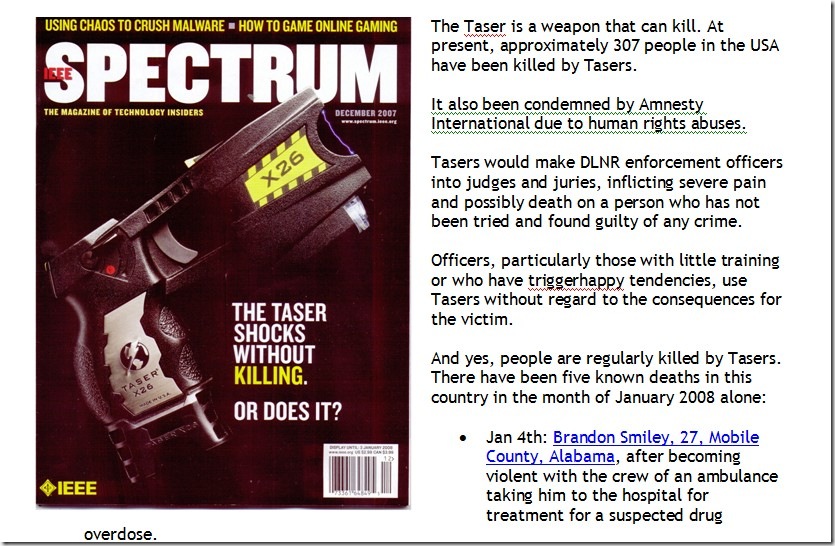
Watch out for this officer. When talking fails, it looks like she thinks it is Taser Time.
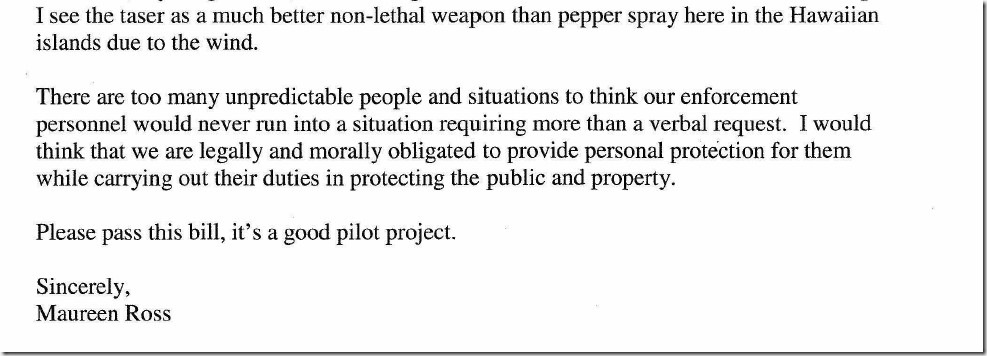
This testimony, apparently by an individual, raises alarm bells. It indicates that Tasers have been issued to officers in Hawaii prior to completion of accreditation:

This testimony by the Nature Conservatory should cause us to ask if officers who just got flashing lights on their cars but who are "inadequately trained" and "lack the equipment they need to do their jobs" should be given Tasers. I don't think these guys are ready yet... how about training them first??

Here's a supervisor who thinks Tasers are non-lethal:

I love this one. Give us the Tasers but it's too difficult for us to get accredited.
This amazing testimony, signed by a supervisor, would like the ok to issue Tasers but without the appropriation for training etc. It acknowledges that there is neither a policy nor a training program in place. Perhaps I'm misunderstanding it, but it seems to ask for Tasers without policy/training, a great reason for not issuing DLNR with those weapons, of course:
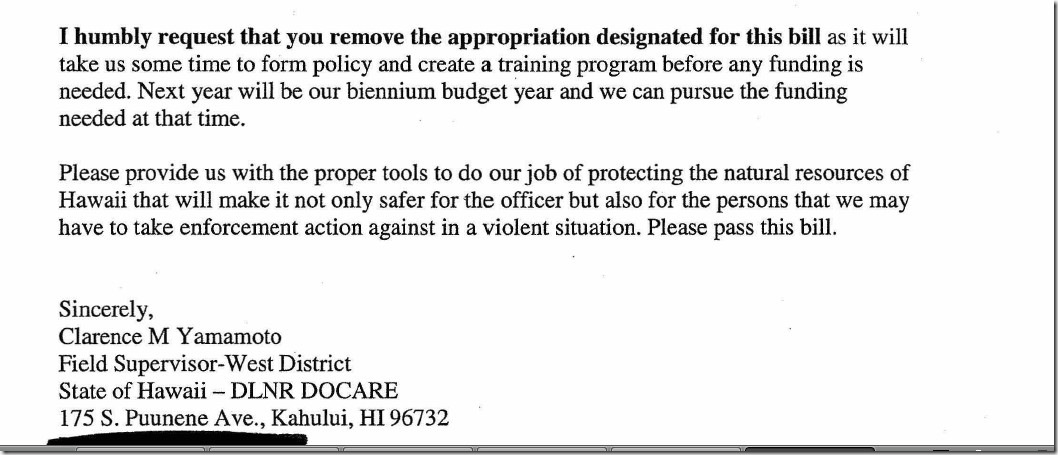
This next one is really interesting to me. ".. in most cases inflicts no permanent damage to the assailant" implies, of course that in some cases it does. Then there is the company claim that deaths when shot by a Taser are due rather to poor health or drug/alcohol intoxication. Of course, this testifier has no plans to ask for a health checkup or do a breathalyzer test before he pulls the trigger. Nor is poor health or intoxication a capital crime, last I checked. But get the last part that I snipped, "Many of our DOCARE officers are senior in age largely due [??] practices and the advanced age required for retirement..." Great reason to give the old codgers Tasers. Because they are apparently too old to do their job. The Legislature might look into this separately to see if it is valid, and meanwhile please protect us from those who are likely to use this weapon because they are incapable of doing anything else!
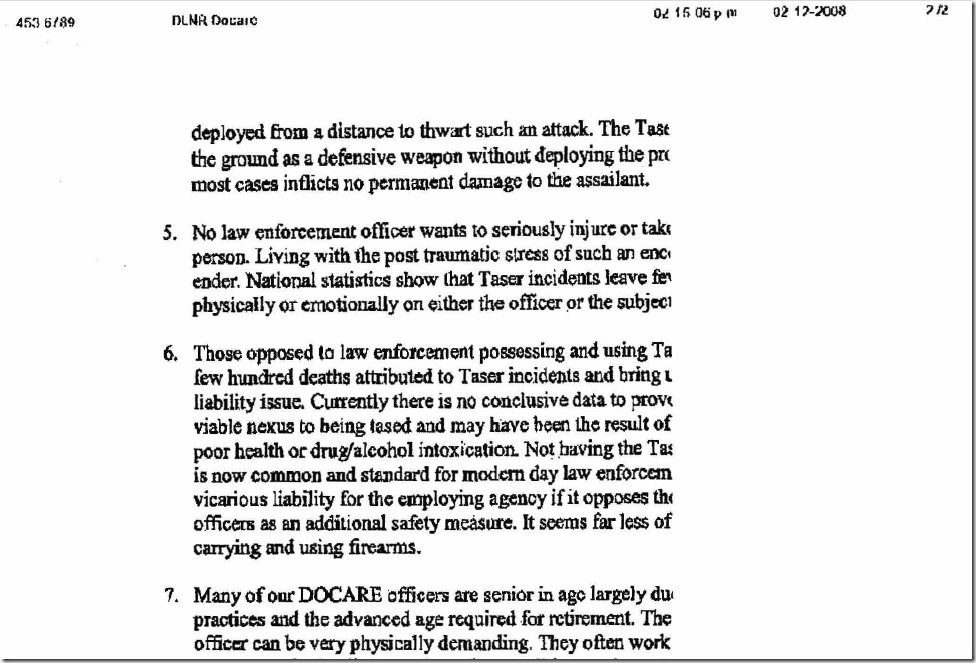
Remember, now, one testifier thinks deaths result when those who are intoxicated are tased. And so they have. Now we have this one, that proposes to use Tasers specifically on all those subjects he encounters who are drug and alcohol users. These two guys should get together and figure it out. Oh, this one thinks it's non-lethal, and you can see how willing an officer might be to actually use one from his testimony:
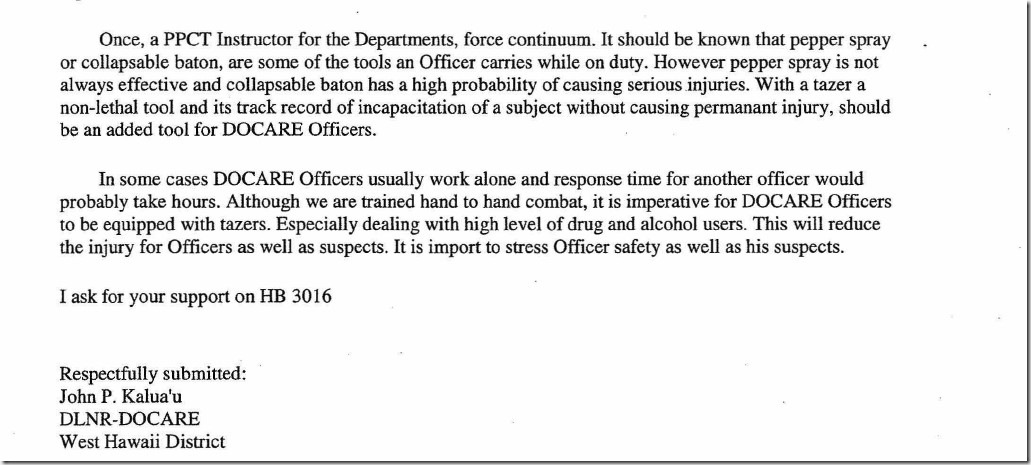
This one is sent from a DOCARE fax and again states that the Taser is non-lethal. Is that now official DOCARE policy?

Ok, now a few demonstrating that the belief that the Taser is non-lethal among these DOCARE testifiers is widespread. I've omitted lots of duplicates and copycats.

Hey... an idea. If "just the sight of a Taser gains voluntary compliance," why not issue them plastic imitation Tasers? This is another person who believe the real thing is non-lethal, so I hold that he should never be issued one until his training is complete.
Here's another supervisor who holds the non-lethal belief:

Here the "compliance" issue raises its head. There is no threat to the officer, but maybe the guy (as actually happened on the Mainland), refused to show his drivers license at a traffic stop and so was tased because he didn't "comply." No joke, the next one tased for compliance purposes could be you. Here it is, in actual testimony:

Yet another non-lethal believer, but otherwise not bad:

Yet another:

"Less lethal" is interesting. It's an admission, of course, that use of this weapon can be lethal, just not as lethal as shooting someone.

One last one, representative of several similar:

Hey, you still here? Thanks for sticking with it.
So we have a demonstrated pattern of belief that the Taser is a non-lethal weapon. Since the language repeats itself consistently in testimony after testimony, it's clear that the officers were given guidance on what to include. The reduction in workman's comp cases was so popular that it had to have come from above. Another popular point was that merely unholstering a Taser would bring about immediate compliance, even in confrontation with drug-crazed subjects.
And that's crucial: officers were being instructed that the use of the Taser is safe, that it is non-lethal. Officers continued to repeat this testimony from committee hearing to committee hearing even though they heard, with their own ears, that the claim of non-lethality is a lie. The ACLU and others testified (as did I). Still, they persisted in telling legislators that Tasers do not kill. (Interestingly, some DOCARE officers omitted the claim of non-lethality but included many or most of the other talking points.)
It's just a question of time before someone is killed by a Taser in Hawaii, but we hasten that time should we allow them to be carried frivolously, or by officers who lack training or the willingness to use safer methods before pulling out their new toy.
When someone is killed or injured and sues, at least because of this testimony, DLNR would seem to have set itself up. If the belief that using this weapon is safe has been advocated by supervisors and others in authority, then the state could be held fully liable.
If old geezers are allowed to use them because they are incapable of exercising the restraint a younger officer might call upon, then we need to overhaul the department entirely.
Let's not subject our citizens to torture, injury and death at the hands of untrained, underfunded, unprepared law enforcement agencies in Hawaii.
Monday, June 09, 2008
Must see: Bill Moyers keynote address
Videos of Bill Moyers' keynote address at the fourth annual National Conference for Media Reform are currently very hot on the web. You can catch his brilliant address on Youtube, at the Conference website, or on Democracy Now.
As conglomerates swallow up newspapers, magazines, publishing houses and broadcast outlets, news organizations are folded into entertainment divisions. The “news hole” in the print media shrinks to make room for ads, celebrities, nonsense and propaganda, and the news we need to know slips from sight.
On Oahu you can catch it tonight (Monday) at 10 p.m. on channel 56, or anytime on the Democracy Now! website.
One neat thing that Democracy Now does: they broadcast closed captions, which gives them the ability to also produce a quick transcript of the program. If you prefer to read text, go to their website and there is the quick transcript of Bill Moyers' address.
A shot across the bow of the Superferry: The Superferry Chronicles due to be published
Researcher Brad Parsons mentioned a Superferry book coming out on his blog:
...A book will be coming out soon on this whole affair...you can already buy that book about the Superferry on Amazon.com. Also, I hear second hand Derrick DePledge has another series coming up on this, but again with no strong conclusions.
Brad, how do you find out all this? Yes, there is a book coming out. See below. As to a future Advertiser series, they still haven't caught up with the April defective weld allegations, so I'm not holding my breath for an exposé. Why would the paper bite the hand that feeds it? But I shouldn't pre-judge. It would be a great thing if those allegations were properly researched and explained.
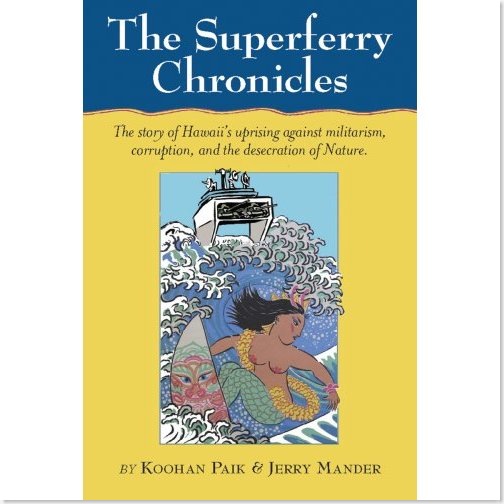 | Superferry: Anatomy of a Boondoggle by Koohan Paik, Jerry Mander Read more about this title...
|
Amazon.com's description: THE SUPERFERRY CHRONICLES is the first book to describe an historically unique, spontaneous, leaderless uprising in the Hawaiian islands. In 2001, an entrepreneur got the idea to start a high-speed, interisland ferry to connect Honolulu with the neighbor islands. Within a couple of years, his idea was taken over by a corporate entity with vast military ties, and the Superferry became prototype for an important piece of Americas sea-based military strategy for the 21st century. As the story unfolds, we see this project riding on a wave of deception and corruptionfrom the governors office, to the federal government, to the military, to the Hawaii Superferry corporation. The Superferry deal was never approved by the people of Hawaii, and this lack of democratic process and its profound environmental impacts enraged many. On Kauai, citizens took to surfboards and effectively blocked the vessel from entering the harbor. Governor Lingle traveled there to admonish the people and let them know that if the boat is blocked again, stiff penalties would ensue. Instead, she found an auditorium overflowing with people whose moving, eloquent, spontaneous testimonies told her that the boat would not be permitted to return. THE SUPERFERRY CHRONICLES is a story of personal and political empowerment thousands of Hawaiis people from all parts of the community taking part in an unprecedented showdown against the latest expression of a centuries-old corporate-tourist-military intrusion into the Hawaiian way of life, landscape, and local sovereignty. This is a grim tale worthy of any colonized banana republic, with just as much double-dealing and intrigue. It is also a story of hope, and love for the land, the sea, and righteousness. Koohan Paik is a media-literacy educator on Kauai, an activist, and an award-winning filmmaker. San Francisco-based Jerry Mander is founder of the International Forum on Globalization and author of the bestselling Four Arguments for the Elimination of Television and In the Absence of the Sacred.
Sunday, June 08, 2008
Innovation? In Hawaii it's just a word
For Governor Linda Lingle, "innovation" is just a 10-letter word. In Silicon Valley it's long been a way of life, but we're not Silicon Valley. We need to recognize hype when we see it.
Let's can the hype. The economy is turning on us, and we want to be survivors.
Hawaii's tourism-dependent economy is very fragile, and it would be good to find an alternative economic model. Unlike other states, we can be easily devastated as energy costs rise, or if visitors decide that other destinations are a better deal or more attractive.
I've written, for example, about the implications for Hawaii of post-Castro Cuba normalizing relations with the United States. With pristine beaches, quality hotels, low prices and reasonable airfares, Cuba could replace Hawaii as a destination of choice.
Even without a major threat such as that, skyrocketing air fares, the loss of more airlines, even rising costs of hotel accommodations, rental cars and interisland travel could negatively impact our main industry.
Then what would we do?
At the same time, development and the profiteers of development continue to run our government. In place of urban planning, developers and contracting firms call the shots on what our islands will look like, where transit will go, who will have access to land, and who will get corporate welfare doled out of our tax money. Check out Mayor’s backers get big rail jobs: Hannemann defends millions doled out so far to his campaign donors:
Nearly one in every three companies working on the city's $3.7 billion mass transit system has contributed to Mayor Mufi Hannemann's campaign.
Although the Governor talks about making "a fundamental shift from an economy over-dependent on land development," there's no indication this is happening. And there is no alternative economic model, so far.
But what about the Governor's push for better science, technology, engineering and math education? Of course, we should do that. We owe our children the best education possible. Finding federal money or business support to improve education is a good thing. But don't confuse science education with jobs. Those students who (for example) go on to graduate near the top of UH's engineering school will have to leave Hawaii to find work in their fields. Neighbor Island residents may not be able to share in the purported benefits, either.
That's why the rhetoric is completely hollow. Hawaii's economy does not benefit if students can't find work here. It also doesn't benefit if entrepreneurs take advantage of tax credit or even improved venture capitol opportunities—and then move jobs to the Mainland. For some reason, Hoku Scientific is a perennial darling of the business sections, but look:
Hoku Materials, a division of Hawaiian-based Hoku Scientific, Inc., held a groundbreaking ceremony in March for a $260 million production plant in Pocatello, ID. The plant will manufacture 2,000 metric tons of polysilicon per year. Polysilicon is the key material used in the production of solar cells and integrated circuits. Hoku and the city of Pocatello signed a 99-year ground lease and are expected to complete construction in 2008. The facility will create over 200 jobs. Hoku’s client, Japan-based Sanyo Electric, has agreed to pay approximately $110 million upfront through prepayments for this product to assist in financing the project. [Idaho Sets Export Record for 2006, businessfacilities.com]
Yup, innovation in Hawaii helps set export records and create jobs—in Idaho.
So how can we improve job prospects right here, for our own benefit?
It won't happen as long as the administration plans to fund change by magic. From the Governor's op-ed today:
Through incredible community support, and no state funding, 10 high school science and technology academies will be launched this fall. These programs will build our students' STEM (science, technology, engineering and math) education, a component of human capital recognized by national and international experts as critical for the 21st century.
We have also mobilized our state employees retirement system to consider funding Hawai'i's innovative ideas. We have established programs, such as the Music Entertainment Learning Experience to nurture and develop the commercial success of Hawai'i's creative human capital. And this year, despite no legislative funding, we will launch the Creativity Academies to complement the STEM academies as students pursue digital media and creative outlets.
Notice the "no state funding" part. Without making an investment, can we magically transform our economy? We're not making any intellectual investment, either. Simply finding cheap ways to improve education, valuable though that is, won't save us.
There's also something about "no pain, no gain." Or, no investment, no return. So why is the guv proud that no state funds are involved? She believes in magic perhaps.
While the Governor repeats her "innovation" mantra and cops some photo ops, "Land and Power in Hawaii" continues as the definitive guide to how this place runs. See if your library has a copy of this classic.
 | Land and Power in Hawaii: The Democratic Years by George Cooper, Gavan Daws Read more about this title... |
We have abundant sunlight, rainfall, geothermal and wave-energy resources, but we are so un-innovative that we are not using them. You'd think alternative energy would be high on our list, but the innovation goes on elsewhere. You'd think homes in Manoa would be using the rainfall that cascades off the rooftops for laundry or even for showers and lawn watering, but no, we pay money for municipal water to pour on the ground instead of using what's free.
Catching up with the outside world on alternative energy could create some jobs and lower our costs as well as increase our ability to compete in a national or world economy.
We are so innovative in our transportation plans that we can't get maps, timetables or even route numbers posted at bus stops in Honolulu. Honolulu's proposed transit system isn't the result of community planning, but rather it's an ongoing political football match.
Our economic planning is not innovative at all. It took Guy Kawasaki, in a talk at the UH business school several years ago, to point out that Hawaii's location in the middle of the Pacific was not an asset to high-tech business, as DBEDT has touted for years, but a severe liability. Rising air fares will likely put the nail in this coffin forever. We need to think of something else to generate jobs.
After I write about what we are not doing I usually get a few emails "so what are you suggesting??" I don't have a good suggestion. I do think that we need to come up with a different economic model, but that's hard to do. You won't find the answer for free posted in a blog.
I hope we can get started talking soon, because the handbasket is moving along faster than anyone thought possible. We need to stop talking about innovation and get busy thinking realistically about our future.


